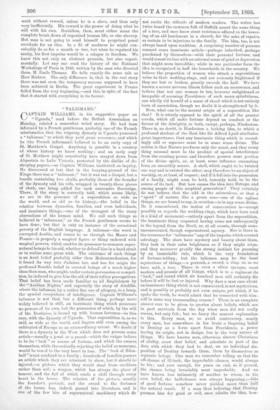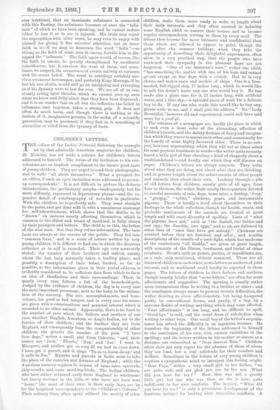"TALISMANS."
CAPTAIN WILLIAMS, in his suggestive paper on "Uganda," read before the British Association on Monday, related a somewhat weird story. He had been informed by a French gentleman, probably one of the French missionaries, that the reigning dynasty in Uganda possessed a "talisman," to which they paid great reverence, and which he (the French informant) believed to be an early copy of St. Matthew's Gospel. Anything is possible in a country of whose history we know nothing ; and an early copy of St. Matthew might conceivably have strayed down from Abyssinia to Lake Victoria, protected by the dislike of de- stroying papers,—so Captain Williams instituted an inquiry. He discovered at last that in the burying-ground of the Kings there was a " talisman ;" but it was not a Gospel, but a bundle containing two skulls, probably those of the founder of the dynasty and his wife, wrapped in twenty-three pieces of cloth, one being added for each successive Sovereign. There, if the story is correctly told, which seems likely, we are in the presence of a superstition as wide as the world, and as old as its history,—the belief in the relation between dynasties, families, and even individuals, and inanimate things,—one of the strangest of the many aberrations of the human mind. We call such things so believed in "talismans," as the French gentleman seems to have done ; but that is only an instance of the occasional poverty of the English language. A talisman—the word is corrupted Arabic, and comes to us through the Moors and France—is properly a magical figure or thing endowed with magical powers, which enables its possessor to summon super- natural beings to his aid, whether to defend him in a hard strait or to realise some great wish. The existence of such things is an Arab belief probably older than Mahommedanism, for it found its way into Judaism too, and has for origin the profound Semitic belief in created beings of a much higher class than man, who might, under certain persuasion or compul- sion, be induced to give him the aid of their loftier prerogatives. That belief has been made familiar to all Englishmen by the "Arabian Nights," and especially the story of Aladdin, where the talisman, by a rather fine use of allegory, is a lamp, the symbol everywhere of intelligence. Captain Williams's talisman is not that, but a different thing, perhaps more widely believed in still, an inanimate thing which possesses no powers of its own, but the possession of which, by the will of the Destinies, is bound up with human fortunes—in this case, with the dynasty of Uganda. That superstition is, as we said, as wide as the world, and lingers still even among the cultivated of Europe to an extraordinary extent. We doubt if there is a dynasty in the West which does not possess some article—usually a jewel or a sword—which the vulgar believe to be its " luck " or source of fortune, and which the owners themselves, while theoretically rejecting the belief as nonsense, would be vexed to the very heart to lose. The "luck of Eden- hall" is not confined to a family ; hundreds of families possess an article which they are reluctant to show, lest it should be injured,—a picture which they would steal from creditors rather than sell; a weapon, which has always the place of honour, and the fall of which sends a chill through every heart in the house. The relation of the picture, usually the founder's portrait, and the sword to the fortunes of the house, has, indeed, passed into literature, and is one of the few bits of supernatural machinery which do not excite the ridicule of modern readers. The writer has twice heard the common folk of Suffolk assert the same thing of a tree, and once knew stout resistance offered to the lower- ing of an old hatchment in a church, for the sake of repairs, as certain to be injurious to the family. The idea, too, is not always based upon tradition. A surprising number of persons connect some inanimate article—perhaps inherited, perhaps purchased by themselves—with their personal fortune, and would resent its loss with an internal sense of grief or depression that might .seem incredible ; while in one particular form the idea is recognised in half the households in the country. We believe the proportion of women who attach a superstitious value to their wedding-rings, and are seriously frightened if they are lost or broken, greatly exceeds the half. We have known a severe nervous illness follow such an occurrence, and believe that not one woman in ten, however enlightened or incapable of accusing Providence of such mean spitefulness, can wholly rid herself of a sense of shock wbich is not entirely born of association, though no doubt it is strengthened by it.
Now, what can be the mental origin of a superstition like that ? It is utterly opposed to the spirit of all the greater creeds, which all make fortune depend on conduct or the favour of the Almighty, or both, except, perhaps, Hindooism. There is, no doubt, in Hindooisin a lurking idea, to which a profound student of the East like Sir Alfred Lyall attributes great importance, that any inanimate thing which is exceed- ingly odd or separate must be in some sense divine. The notion is that Nature produces only the usual, and that every thing unusual must be the product of special interference from the creating power, and therefore possess some portion of the divine spirit, or, at least, some influence emanating from an unearthly source. A shell, which ought to be twisted one way and is twisted the other, may therefore be an object of worship, or, at least, of respect ; and if it fell into the possession of a family, might soon be held, honestly hold, to be the source of its luck. But how comes the idea into Earope, and among people of this sceptical generation P They certainly do not believe that the odd is the miraculous, or that a "sport" of nature, like a green rose—one of the ugliest things, we are bound to say, in creation—is in any sense divine. Be it remembered, the notion of consecration is—except possibly as regards the wedding-rings, which have been used in a kind of sacrament—entirely apart from the superstition, the inanimate thing respected having come not unfrequently in the legend from the Devil, or, at all events, through some unconsecrated, though supernatural, agency. Nor is there in the reverence for 'talismans "any of the impulse which created astrology. The stars have mystery and beauty about them, they look in their calm brightness as if they might reign, and they moreover gratify the strong instinct for guessing by an immutable rule, which is the very foundation of fortune-telling; but the talisman may be the least mysterious of things,—a portrait, a sword, a ring, or, as we have said, a tree. There is even a silver epergne, most modern and prosaic of all things, which is to a regiment its "luck," and round which six hundred men will certainly die before it will be lost or injured. Why does a man care about an inanimate thing which is not consecrated, is not mysterious, and is possibly or probably not even unique, yet which, if he spoke the truth, he would admit that he connected with him- self in some way transcending reason P There is no complete answer ever to be given to queries about beliefs, which are in part survivals from the day when men did not really reason, but only felt ; but we fancy the nearest explanation is this. Every man, or, to avoid controversy, nearly every man, has somewhere in his brain a lingering belief in Destiny as a force apart from Providence, a power having its origin, not in design, but in the very nature of things. We have known men, otherwise sincere Christians of ability, avow that belief, and calculate as part of the data with which they had to deal, on an individual dis- position of Destiny towards them, them by themselves as separate beings. One man we remember telling us that the off-chance of ill-luck, the improbable chance, would always be his; and pure enough, for years on end, so it proved, the chance being invariably most improbable. And we have known less intimately of another to whom, in his own belief, the half-chance was always happening ;—bits of good fortune somehow never yielded more than half the natural result. If a man thus believing that Destiny pursues him for good or evil, once admits the idea, how- ever irrational, that an inanimate substance is connected with this Destiny, the substance becomes at once the "talis- man" of which we have been speaking, and he cannot endure either to lose it or to see it injured. His brain may reject the superstition with utter scorn, he may even be angry with himself for giving it five minutes' attention, but an inner faith in it—if we may so desecrate the word "faith "—as strong as the faith of some men in omens, forbids him to dis- regard the "talisman." The faith again would, of course, like the faith in omens, be greatly strengthened by accidental coincidences; but it survives the want of them, and some- times, we suspect, the occurrence of events entirely at variance with the secret belief. The trust in astrology certainly sur- vives erroneous horoscopes; and probably King Mwanga, if he lost his two skulls, would still go on intriguing and arranging as if his dynasty were to last for ever. We are all of us con- stantly acting upon theories which we cannot give up, even when we know and fully admit that they have been disproved ; and it is no wonder that on all but the reflective the belief in talismans, once begotten, takes a strong grip. It does not often do much harm, and though there is nothing at the bottom of it, imaginative persons, in the midst of a scientific generation, may be pardoned if they find in it something of attraction or relief from the tyranny of facts.



































 Previous page
Previous page